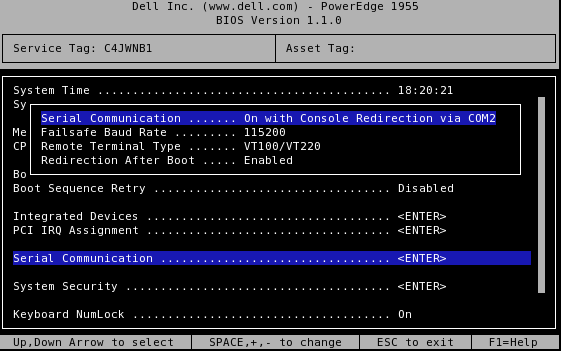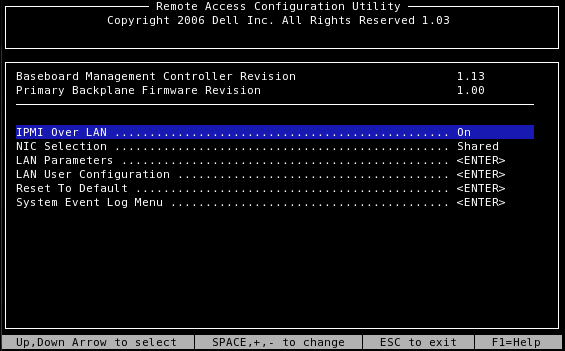Difference between revisions of "BXadmin:Configure IPMI SOL"
(→console=ttyb, no physical console login) |
|||
| (4 intermediate revisions by one other user not shown) | |||
| Line 14: | Line 14: | ||
On linux, modprobe ipmi_devintf and ipmi_si | On linux, modprobe ipmi_devintf and ipmi_si | ||
| − | <pre>ipmitool -I open lan set 1 ipaddr <ip address> | + | <pre>ipmitool -I open lan set 1 ipsrc static |
| + | ipmitool -I open lan set 1 ipaddr <ip address> | ||
ipmitool -I open lan set 1 netmask <netmask> | ipmitool -I open lan set 1 netmask <netmask> | ||
ipmitool -I open lan set 1 defgw ipaddr <ip address> | ipmitool -I open lan set 1 defgw ipaddr <ip address> | ||
| Line 35: | Line 36: | ||
Then append to the kernel line: | Then append to the kernel line: | ||
<pre>console=tty0 console=ttyS1,57600n8</pre> | <pre>console=tty0 console=ttyS1,57600n8</pre> | ||
| + | |||
| + | Finally, edit ''/etc/inittab'' to get a login prompt on ttyS1: | ||
| + | <pre>co:2345:respawn:/sbin/agetty ttyS1 57600 vt100-nav</pre> | ||
| + | |||
| + | = Solaris on Dell R715 = | ||
| + | The BMC on the R715 seems to default to 115200 when the BIOS is not controlling it. The 'failsafe' setting in the BIOS seems to be only for BIOS output. After that, the baud rate jumps back up to 115200. | ||
| + | |||
| + | In any case, "Console redication via COM2" and "Redirect After Boot = Enabled" need to be set in the BIOS. Failsafe baud rate can mostly be anything, though something between 9600 and 57600 seems to be the safest with SOL. Also, comment out the ''splashimage'' line in '''/rpool/boot/grub/menu.lst''' so you can interact with GRUB via console. | ||
| + | |||
| + | The pmadm and sacadm commands came from http://pbraun.nethence.com/doc/sysutils_solaris/solaris.html | ||
| + | |||
| + | == console=text, zsmon for serial login prompt == | ||
| + | <pre>$ eeprom console=text | ||
| + | $ pmadm -r -p zsmon -s ttyb | ||
| + | $ pmadm -a -p zsmon -s ttyb -i root -v `ttyadm -V` -m "`ttyadm -i 'Terminal disabled' -l 115200 -m ldterm,ttcompat -S y -d /dev/ttyb -s /usr/bin/login -T vt100`" -f u</pre> | ||
| + | |||
| + | Then restart zsmon if you don't want to reboot: | ||
| + | <pre>$ sacadm -k -p zsmon | ||
| + | $ sacadm -s -p zsmon</pre> | ||
| + | |||
| + | Then edit '''/etc/default/login''' and comment out "CONSOLE=/dev/console" to allow root to login via the /usr/bin/login prompt on ttyb. | ||
| + | |||
| + | == console=ttyb, no physical console login == | ||
| + | <pre>$ pmadm -r -p zsmon -s ttyb # make sure we don't have anything fighting for access for ttyb | ||
| + | $ eeprom console=ttyb | ||
| + | $ eeprom ttyb-mode="115200,8,n,1,-" | ||
| + | $ svccfg -s console-login setprop ttymon/label=115200</pre> | ||
| + | |||
| + | Alternatively, instead of setting ttymon/label, you can change the definition for ''console'' in '''/etc/ttydefs''' | ||
| + | |||
| + | Alternatively alternatively, you can set ttymon/device to /dev/ttyb and ttymon/terminal_type to vt100 | ||
Latest revision as of 12:45, 9 May 2012
Note: This was written with the Dell BMCs in mind, but should loosely apply to other IPMI SOL implementations.
Configure console redirection by going into Serial Communication in the BIOS:
Note: Set the Failsafe Baud Rate to 57600! Other speeds may or may not work!
In the Remote Access BIOS, enable IPMI over LAN and set NIC selection to shared.
The rest of the network/user settings can either be configured via the Remote Access BIOS screen, or via the OS.
On linux, modprobe ipmi_devintf and ipmi_si
ipmitool -I open lan set 1 ipsrc static ipmitool -I open lan set 1 ipaddr <ip address> ipmitool -I open lan set 1 netmask <netmask> ipmitool -I open lan set 1 defgw ipaddr <ip address> ipmitool -I open lan set 1 vlan id 1 ipmitool -I open lan set 1 access on ipmitool user set name 2 admin ipmitool -I open user set password 2 ipmitool channel setaccess 1 2 callin=on ipmi=on link=on privilege=4 ipmitool user enable 2
Run ipmitool -I open lan print to see if VLANs are supported.
Enable GRUB and the kernel to output to serial.
In /boot/grub/menu.lst:
serial --unit=1 --speed=57600 terminal --timeout=5 serial console
Then append to the kernel line:
console=tty0 console=ttyS1,57600n8
Finally, edit /etc/inittab to get a login prompt on ttyS1:
co:2345:respawn:/sbin/agetty ttyS1 57600 vt100-nav
Solaris on Dell R715
The BMC on the R715 seems to default to 115200 when the BIOS is not controlling it. The 'failsafe' setting in the BIOS seems to be only for BIOS output. After that, the baud rate jumps back up to 115200.
In any case, "Console redication via COM2" and "Redirect After Boot = Enabled" need to be set in the BIOS. Failsafe baud rate can mostly be anything, though something between 9600 and 57600 seems to be the safest with SOL. Also, comment out the splashimage line in /rpool/boot/grub/menu.lst so you can interact with GRUB via console.
The pmadm and sacadm commands came from http://pbraun.nethence.com/doc/sysutils_solaris/solaris.html
console=text, zsmon for serial login prompt
$ eeprom console=text $ pmadm -r -p zsmon -s ttyb $ pmadm -a -p zsmon -s ttyb -i root -v `ttyadm -V` -m "`ttyadm -i 'Terminal disabled' -l 115200 -m ldterm,ttcompat -S y -d /dev/ttyb -s /usr/bin/login -T vt100`" -f u
Then restart zsmon if you don't want to reboot:
$ sacadm -k -p zsmon $ sacadm -s -p zsmon
Then edit /etc/default/login and comment out "CONSOLE=/dev/console" to allow root to login via the /usr/bin/login prompt on ttyb.
console=ttyb, no physical console login
$ pmadm -r -p zsmon -s ttyb # make sure we don't have anything fighting for access for ttyb $ eeprom console=ttyb $ eeprom ttyb-mode="115200,8,n,1,-" $ svccfg -s console-login setprop ttymon/label=115200
Alternatively, instead of setting ttymon/label, you can change the definition for console in /etc/ttydefs
Alternatively alternatively, you can set ttymon/device to /dev/ttyb and ttymon/terminal_type to vt100

